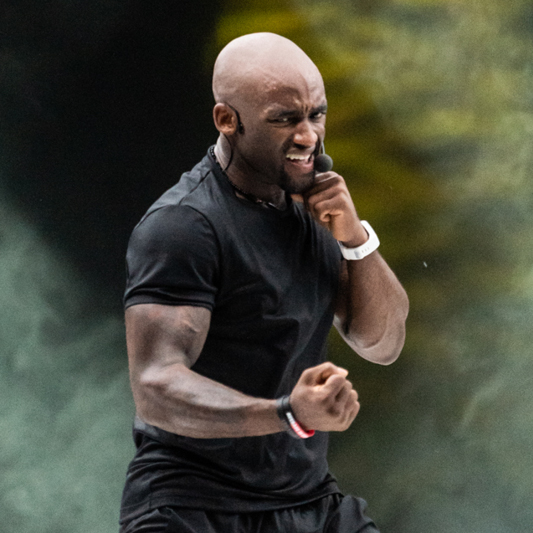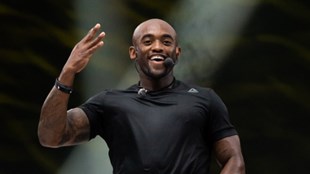Sarah Shortt: Hi Marlon! You just finished filming the latest BODYPUMP™ and BODYCOMBAT™ releases. What's it like to film multiple classes back-to-back?
Marlon Woods: Presenting on Masterclass is scary because you film one and you think ‘That was good.’ But then you put it out there to the world and people might say something negative, or not like your performance.
Until you’ve done it, you can’t imagine the pressure and the stress and the anxiety and the worry. You’re stressed out all week. You mess something up in a rehearsal on the Monday and then you fix it on the Tuesday. But then you mess something else up on Wednesday and then you realize you’re filming on Friday. And then all of a sudden, you’re in front of the cameras and the lights and all of the people…. and you forget how to even stand up. Seriously, for the entire first half of the Upper Body Warm-Up of BODYCOMBAT 82, I was panicked that I was going to fall over.
It's crazy how much we put into Masterclass and then once it’s done, we put the same stress on ourselves all over again because we’re worried about what people are going to say [once it goes out to Instructors and consumers]. The thing to remember is that nobody gets up there to do the worst job possible. Nobody is ever like, ‘I’m going to get there and I’m going to really mess this up’.

That sounds incredibly challenging. How do you cope with that stress?
For me it’s about remembering that nothing in the world is good or bad – it’s only thought that makes it so.
I used to be so threatened by Rene [Vogel] and Reagan [Kang] because I felt like they were so much better than me. And every time they got to film and I didn’t, I thought, well, maybe Les Mills doesn’t like me anymore. You know, a few weeks after filming, everyone starts asking each other: “Hey, did you get invited to film again next round?” And I might be like, “I didn't get that email yet” and then the panic starts to set in. The self-doubt arrives.
I had a really honest conversation with Kylie Gates a few months before I filmed BODYPUMP™ 110. I said: “I'm really struggling with confidence. I feel like every time I don't get invited back to film, it's because I suck and I feel like I'm going to get replaced. I feel like I'm not doing a good job.” She said: “Listen. You bring something completely different from anyone else. And everyone else brings something completely different from you. You can’t be worried about comparing yourself to others. Instead, try to think about where you fit into the puzzle.”
I used to be so threatened by Rene [Vogel] and Reagan [Kang] because I felt like they were so much better than me. And every time they got to film and I didn’t, I thought, well, maybe Les Mills doesn’t like me anymore.
Very cool. How did her advice impact your mindset?
It helped me so much with how I viewed myself and my peers, and it also helped me become a better team member.
Here’s an example: When we filmed BODYPUMP 110 down on the South Island, I really wanted to teach the Squat track. But it got given to Ben [Main] and I got given Chest. Internally I was like, ‘Oh crap, I never taught the Chest track before and I hate Chest,’ but at the same time I thought, ‘How I can apply this newly learned lesson?’
Rather than being resentful, I decided that I'd tell Ben some of the cues I was going to use and maybe he’ll use them, maybe he won’t. But I’m going to work on making this Chest track the most Marlon track of all time. It was different, and it was a challenge. I had to take everything about me – my personality, the drama, the tricks I have – and bring it to the bench. You can’t dance too much when you’re lying down. I had to tap more into my strength as a technical coach, be more composed and calm. And it was so much fun!
When people ask me what my favorite release was to film, I’ll often say BODYPUMP 111 and a big reason for that is because it came right after 110. BODYPUMP 110 really changed how I viewed my part in the team. For lack of a better word, teaching that release was magic, and it truly took all of those comparison issues away. I immediately started to care less about which tracks I got. My attitude switched to: 'What can I bring to these tracks to fit in with the team?’ It became less about what people were going to think and more about how can I be my absolute best for this track and for this release so that the end user has the most amazing experience?
Once you’re on social media, you get all of your notifications, comments, likes, followers and so it can be easy to succumb to the delusion that the world is just about you. And what that creates is this unhealthy obsession with what people are thinking about us.
You have a huge following on social media and I'm sure many would love to emulate your success. What's your journey been like to attract over 80K followers?
It's a constant learning process. The biggest revelation for me over the past four years – and this is going to sound strange – is that I don’t actually enjoy being on social media all the time.
I first got Instagram in 2016, and at that stage it was all to promote my gym. I was into bodybuilding and power lifting, so everything I posted was your standard bodybuilder, fit-fam stuff: lifting weights, workouts, come in for a 7-day pass, check out my abs, blah blah blah… but it didn’t sit well with me at all. And then as I was teaching, I started your standard, here’s a snippet of me teaching this in class, here’s a picture of my clothes… and that didn’t sit well either. Eventually I was like ‘You know what, I’m gonna’ take social media seriously. What does Marlon enjoy? Who is Marlon?’
A few years ago, I used to feel like I needed to be on social media constantly and I had periods of frustration when my profile wasn't growing as quickly as I'd like. Eventually, I realized a lot of my dissatisfaction was borne out of posting something just for the sake of it – out of a fear that I would become irrelevant if I didn’t and people would stop following me. But what happens when it comes from that place is that I’m not speaking from my heart – which is what so many people enjoy about my page in the first place. I realized that when I was trying to be strategic or too intentional, the post didn’t feel right. It made me feel exhausted and disengaged.
There were a few times when I decided: right, I’m going to post twice a day; I’m going to post every day this week; I’m going to write a blog; I’m going to do a regular live stream; I’m going to do this, I’m going to do that… but it created a nasty taste in my mouth. Because who says I have to do this? If I say I’m going to do something and then I don’t, is everybody going to be pointing at me and judging? Thinking that I’m not a man of my word? Of course they’re not – it’s just a pressure that I’m putting on myself.
When I let go of all that and said ‘I’m going to post the way I want to post, when I want to post, and I want the post to be aligned with my values,’ it’s crazy how I immediately began to feel better about it. And I found that my profile began to rise, and more people were engaged with my posts because they could tell I was speaking from the heart. The biggest revelation was learning to only post when I truly had something to say.
Marlon's Top Tips to Success on Social Media
- Create content that's aligned with your values and who you are as a person.
- Know your audience. What sort of content is going to be valuable to them?
- Understand your style. Being consistent in your tone and personality will help your followers get to know you and know what to expect from your posts.
- Be social. I do try to respond to as many messages and comments as possible. I especially love doing birthday shout outs for people. It's not always feasible to reply to everything, but It's important to interact as much as you can.
- Less is more!
Social media has many advantages, but a downside is that it can encourage the "culture of me". What are your thoughts on the topic?
A few years ago, my profile was blowing up and I thought ‘Wow, everybody's talking about me.’ This was like 2018, 2019. I saw all these comments about me, and I didn't see anybody talking about anybody else. And I talked to my friend Rebecca about it. And she was like: “Bro, because I love you, I want you to know that the world is not about you.” And I was like: “What do you mean? More often than not, the notifications I get in the Facebook group are about me”. And she said: “Yeah. Because they're about you.” I was like, huh?
The next day, she sent me a link to an article about Spotlight syndrome. And I said: “Thank you. I was being a douche bag.” It was very eye-opening for me because it made me realize that this is what social media hinges on: an obsession with ourselves in the eyes of others.

Do you worry about what people think of you on social media?
Have you ever heard of the term ‘sonder’? The concept of sonder is the realization that every single person you come across has their own life and has come across thousands of people that you will never come across. They have their own story, their own problems… they have their own friends, their own birthdays, their celebrations and their own heartbreaks. And if we think about the complexity of every single person you come across, it's almost overwhelming.
We're center of our own universe. From the moment of birth, everything is about you: your first steps, your first words, your first birthday as you get older. It's about your grades, your school pictures, your first date…
Once you’re on social media, you get all of your notifications, comments, likes, followers and so it can be easy to succumb to the delusion that the world is just about you. And what that creates is this unhealthy obsession with what people are thinking about us.
But if we take that same mentality and put that lens on everybody else in the world, you realize that nobody's thinking about you because they're thinking about themselves. If I'm concerned with me, my likes, my comments, my followers, my school, my job, my spouse, my friends, my family, my dogs, my cats, my bills, my worries, my stress… what do you think the next person is thinking about?
Here's an example: If I get a stain on my shirt, my day is ruined. Because I'm obsessing over that stain. But then I think, ‘how many stains did I see on people's shirts last week? Or how many people's hair wasn't brushed perfectly, or how many people forgot to put deodorant?’ And I have no idea. Life reflects social media in the sense of people only care for as long as it takes to scroll past it. Somebody may walk past you and see the stain on your shirt. But they won’t be thinking about that once that moment is over. They’re not at home thinking ‘that guy with the stain on his shirt, his life must just be out of control.’ I’ve tried to take the pressure off myself lately because, in the most human way possible, no one cares.
This attitude has allowed me to be more relaxed about how I live my life, and be okay with making mistakes because really, nobody is thinking about me. That person is worried about what they’re going to eat for dinner. This person is worried about why their girlfriend told them: “Hey, we need to talk.”
It’s such a freeing realization that I don’t have to live up to everybody else’s expectations. And even if the worst thing happened, people always move on. The realization that people have their own lives, and everybody’s mostly concerned with themselves, is like letting out a huge exhale.
Marlon Woods is a BODYCOMBAT and BODYPUMP Trainer and a LES MILLS TONE™ Presenter. He is a Les Mills Ambassador for BODYCOMBAT and BODYPUMP. Originally from the US, Marlon currently lives in Sydney, Australia where he works in a research lab at The University of Sydney.








